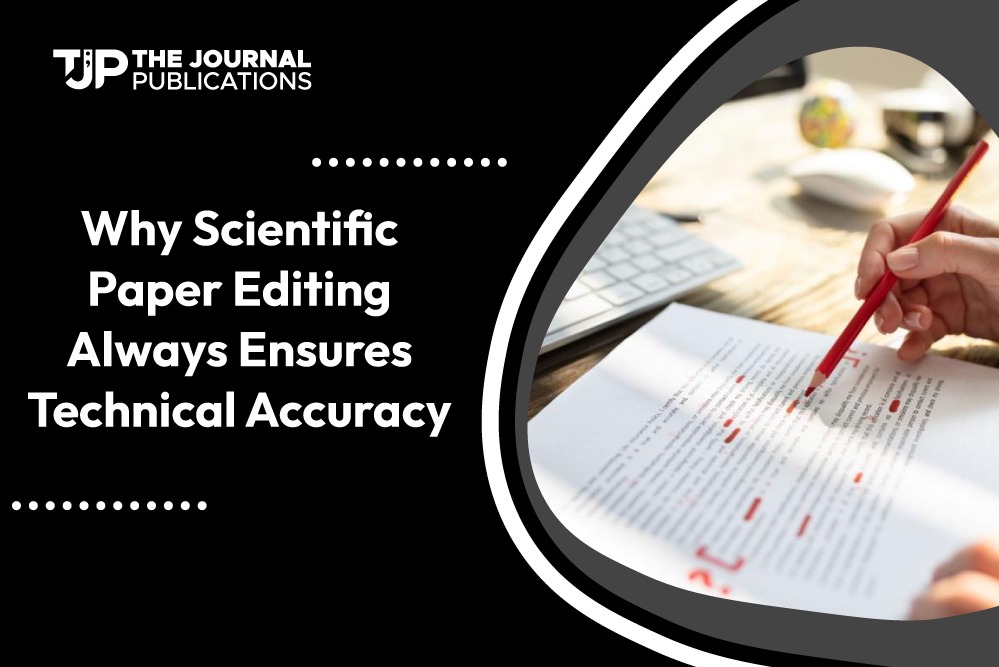Outline
- Intro
- Technical Accuracy in Scientific Research
- What is scientific paper editing?
- Roles and Responsibilities of a Scientific Editor
- Benefits of Subject-Specific Knowledge in Scientific Editing
- Types of Errors Scientific Editors Correct
- Why General Editing Doesn’t Suffice for Scientific Papers
- Technical Accuracy: The Backbone of Scientific Integrity
- Ensuring Subject Relevance through Specialized Editors
- Scientific Editor’s Role in Peer Review
- Impact of Professional Editing on Publication Success
- How Technical Editors Help Avoid Misinterpretation
- Examples of Scientific Editing Impact in Various Fields
- How to Choose a Qualified Scientific Editor
- Cost vs. Value: Is Scientific Editing Worth It?
- Wrapping Up: Why Scientific Editing Is Essential for Technical Accuracy
Intro
Scientific research is a complex, rigorous field. It requires precision, technical accuracy, and clear writing. When presenting discoveries, researchers must be clear. Their work must be free of technical errors and ambiguities. This is where scientific paper editing comes into play. Professional scientific editing is more than proofreading. It is a critical process. It ensures technical accuracy. It improves readability. It maximizes the paper’s impact in the scientific community. Let’s explore why editing scientific papers is vital. It ensures accuracy and preserves the integrity of research.
Technical Accuracy in Scientific Research
Scientific research always demands a high level of technical accuracy. Errors in data interpretation, terminology, or methods hurt the results. They also mislead readers and damage the researchers’ reputations. Technical accuracy in scientific papers is vital. It ensures the study’s credibility and advances scientific knowledge.
What is scientific paper editing?
Scientific paper editing goes beyond traditional editing or proofreading. It involves expert editorial services. They improve a paper’s rigor, language, and format. They must preserve the research’s accuracy. The Scientific editors fix errors, improve clarity, and meet journal-required standards.

Responsibilities of a Scientific Editor
A scientific editor handles enhancing the quality of a paper by focusing on:
Ensuring accurate scientific terminology and technical details.
Improving readability and flow without altering the scientific intent.
Confirming adherence to journal-specific guidelines.
Benefits of Subject-Specific Knowledge in Scientific Editing
Professional scientific editors are often experts in specific fields. They hold advanced degrees like a Ph.D. or M.D. Their knowledge helps them grasp complex concepts. It ensures that the technical details are accurate and meet scientific standards.
Types of Errors Scientific Editors Correct
Scientific editors address various technical issues, including:
Terminology Errors: Ensuring the precise use of scientific terms.
Data Interpretation: Ensuring accurate representation and discussion of data.
Researchers provide a clear description of their methods to ensure reproducibility.
Formatting and citations: aligning the paper with specific journal requirements.
Why General Editing Doesn’t Suffice for Scientific Papers
General Editors lack the tech skills to catch errors in scientific writing. Scientific Paper editing requires deep knowledge of the field. It also needs an understanding of complex research methods and discipline-specific terms. This specialized approach ensures the technical rigor that general editing cannot provide.

Technical Accuracy: The Backbone of Scientific Integrity
The technical integrity of a paper is foundational to its acceptance and impact. Accurate results and methods lend credibility to the research. They allow peers to trust and build on the findings. Scientific editors are vital for integrity. They find and fix errors.
Ensuring Subject Relevance through Specialized Editors
Subject-specific editors understand the nuances and standards unique to each discipline. For example, a physics editor focuses on equations and theory. A biology editor emphasizes methods and terminology. This specialization ensures that each paper meets the highest standards for technical precision.
Scientific Editors Role in Peer Review
Scientific editors significantly serve as a bridge between researchers and the peer reviewers. By improving clarity and accuracy, they help papers pass peer review. Well-edited papers communicate findings and reduce revision requests.
Impact of Professional Editing on Publication Success
Studies say that top journals prefer papers edited by professional editors. They boost readability and technical quality. They ensure that the work meets journal standards. This gives researchers an edge in publishing.
How Technical Editors Help Avoid Misinterpretation
A scientific editor’s subject expertise helps clarify ambiguous statements. This reduces the risk of misinterpretation. They provide feedback on unclear sections. This way, authors communicate their findings to a global audience.
Examples of Scientific Editing Impact in Various Fields
- Medical Research: Ensuring accuracy in drug dosage, medical terminology, and patient data.
- Engineering: Enhancing clarity in complex calculations and technical diagrams.
- Environmental Science: Communicating statistical data and ecological impacts with precision.
Each field needs editors with specific knowledge. It helps prevent misunderstandings or errors unique to that discipline.
How to Choose a Qualified Scientific Editor
Selecting a qualified editor is crucial for ensuring the quality of the final paper. Look for editors with:
- Advanced degrees in relevant fields.
- Experience in scientific publishing or editing.
- Positive reviews and testimonials from previous clients.
Cost vs. Value: Is Scientific Editing Worth It?
Professional editing services cost money, but they are worth it. Scientific editing services are vital to research. It boosts readability, precision, and publication odds. Researchers are confident that their work is well communicated. =
Wrapping Up: Why Scientific Editing Is Essential for Technical Accuracy
Scientific editing is vital in publishing research. It makes the paper accurate and appealing to reviewers and scientists. Scientific paper editing help improve research papers. They have subject expertise and a keen eye. Their work boosts the papers’ quality and integrity. This helps researchers present their findings with confidence.





